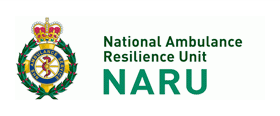Course Details
- Course duration: 3 days
- Course category: Command, Resilience, TCC1
- Start/finish time: Start time: 08:00hrs
Finish time for final day: 18:00hrs (approximately)
The Tactical Command Course will give the delegates the skills, knowledge and confidence to manage a wide range of incidents at a Tactical level.
Places on this course are only available to managers who are expected to perform the role of Tactical Commander as part of their daily role and be on the Trust on call rota at a Tactical level.
This course competency based and assessed and is Pass/Fail. The course is aligned to current JESIP Doctrine, NARU C2 and NOS.
Course overview
Course Aim
This course has been developed in response to requests from Ambulance Trusts, for Command courses aimed specifically at the Tactical level of Command
The command of a large scale or challenging in incidents such as mass casualty, flooding or terrorism events are recognised as being extremely complex and challenging; and this course has been designed to give commanders the knowledge and confidence in order to assist in the management of such events.
The Tactical Command course provides a common standard of training and education aligned to the Ambulance Commanders National Occupational Standards (NOS) as well as the Joint Emergency Services Interoperability Programme (JESIP) Joint Doctrine: the Interoperability Framework and National Ambulance Service Command and Control Guidance document (2015).
This course is competency based (Pass/Fail) and delegates will be formatively assed throughout the duration of the course. Once the course has been successfully completed the delegate will then complete a post course assignment. This assignment must be completed to gain certification.
Course Programme contents
- Assessment of understanding the pre course learning
- Daily Assessments
- Command and Control Guidance
- Decision Making
- Specialist Resources
- Table Top Exercises
- Managing the Media
- Documentation
- Public Enquiries
- Final Exam Pass/Fail
Intended Learning Outcomes
- Demonstrate an understanding of the JESIP principles
- Demonstrate an understanding of the National Ambulance Service Command and Control Guidance
- Demonstrate an understanding of the Ambulance role during a Major Incident
- Demonstrate an understanding of the Roles and Responsibilities of the Tactical Commander
- Demonstrate an understanding of decision making at the Tactical level
- Understand the role of NILO and Tactical Advisors
- Demonstrate an understanding of NHS Ambulance Service specialist Assets
- Demonstrate an understanding of the Legal Aspects of Tactical Command
- Understand the importance of documentation as a Tactical Commander
- Demonstrate an Understand of the issues when managing the Media
Eligibility Criteria
Ambulance managers who are expected to perform the role of Tactical Commander as part of their daily role, are expected to respond to and attend a multi-agency Tactical Coordinating Group (TCG) and are on their Trusts on-call rota at a Tactical level.
For those who are Tactical Commanders within the control room please contact jackie.Thurlow@wmas.nhs.uk to discuss suitability of the course.
This is not a refresher course. Once this course has been completed it is your responsibility to maintain a portfolio to show Continued Professional Development (CPD).
Due to government restrictions the Command courses are being delivered with reduced numbers. It is no longer possible to book yourself a place on these courses. If you are required to attend either the Operational or Tactical Command course please contact the approving manager for your Trust listed below.
Chris Sims – WALES Gareth Boynton – EEAS
Joe Barrett – NWAS Neil Kirk – YAS
Jason Hallahan – LAS Keith Sharpe – EMAS
Graeme Few – SCAS Darren Claydon – IOW
Simon Swallow – NEAS Ian Eldridge – SECAMB
Justin Williams – SWAST James Williams – WMAS
Dave Welbourne – Guernsey – Jersey
Methods of Delivery
Pre-course learning and assignment, daily knowledge checks, blend of presentations, immersive exercises, group discussions and sessions with External Subject Matter Experts, Pass/Fail exam and post course assignment.
If you have any additional education needs which may impact on your learning please ensure the course lead is made aware prior to your attendance. You can also contact info@narueducationcentre.org.uk.
Dress Code
Essential items to bring – Sanitizer and x2 surgical masks.
The dress code for the course is normal Trust uniform.
Course Location
COPTHORNE HOTEL MERRY HILL-DUDLEY
The Waterfront Level Street,
Brierley Hill Dudley,
West Midlands, DY5 1UR
View map and directions here. https://www.millenniumhotels.com/en/dudley/copthorne-hotel-merry-hill-dudley/
Accommodation
No accommodation is provided, however a working lunch will be available for the duration of the Course.
Pre-read Downloads
data:text/mce-internal,acf-editor-5b1798e49c979,https%3A//narueducationcentre.org.uk/ecourse/ied-awareness/The pre-course assignment must be completed and returned to Jackie.king@wmas.nhs.uk at least 72 hours prior to attending the course. This is a mandatory requirement. If you need any advice or assistance, please contact Jackie.
Any delegate found submitting another person work as their own will be referred to their Line Manager and NARU Head of Education. This could result in disciplinary action.
You must ensure that you are familiar with the Joint Emergency Services Interoperability Principles (JESIP) Joint Doctrine: Interoperability Framework document and National Ambulance Command and Control Guidance (2015). Civil Contingencies Act 2004, Emergency response and recovery – Updated 2013, NHS England – Emergency Preparedness, Resilience and Response Framework and Human Rights Act 1998.
- Joint Emergency Services Interoperability Principles (JESIP) Joint Doctrine: JESIP Joint Doctrine – The Interoperability Framework [edition 2 – July 2016]
- Civil Contingencies Act 2004 – http://www.legislation.gov.uk/ukpga/2004/36/contents
- Emergency response and recovery – chapters 4&5 – Updated 2013 – https://www.gov.uk/government/publications/emergency-response-and-recovery
- NHS England – Emergency Preparedness, Resilience and Response Framework – Chapters 8&9 https://www.england.nhs.uk/wp-content/uploads/2015/11/eprr-framework.pdf
- Human Rights Act 1998 – http://www.legislation.gov.uk/ukpga/1998/42/pdfs/ukpga_19980042_en.pdf
Please watch the Major Incident film and the individual chapters – Initial Response, M/Ethane, JDM, IIMARCH, Debrief (Click on link below and then scroll down page)
Also watch the IED Awareness video, which can be found on the NARU Education Website – E-learning or click on the link below.
There will be assessments on each day of this course so your understanding of the above documents is essential.






